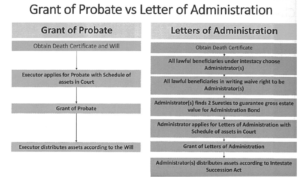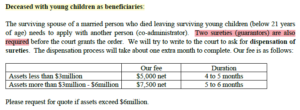Skip to content
- The pros of doing a Will, even a basic one, far outweighs the cons of not having done one (and thus by default, relying on the Intestate Succession Act. It will cost your estate less money and time cost if you have a Will.

- No Will: Requires every other beneficiaries to renounce that they do not want to be the Administrator. The issue is magnified when the other beneficiaries are stuck overseas. There might also be disagreements between who that trusted individual(s) is, ending up to be resolved through litigation. This is as compared to having a Will where the Executor is already pre-decided and hence no renunciation is needed.
- No Will: “Someone” needs to apply for the Letter of Administration to have access to your assets. This person, also known as the Administrator, is usually one of the to-be beneficiaries of your Estate, or someone else if every beneficiary agrees for him/her to be so. As the Administrator, he/she will be the one managing / distributing your Estate. This also means that it is entirely possible that someone you distrust be in-charge of managing and distributing your assets after you pass on. Unlike common belief, the Courts do not actively monitor to ensure it is distributed correctly, rather someone has to report before the Courts step in in the event of foul play. Rather than leaving to chance, having a Will allows you to choose and decide beforehand who this trusted individual is.
- No Will: Where minors are involved, 2 co-administrators are required instead where in the case with a Will, only a minimum of 1 executor is required. Also, 2 sureties (guarantors) are also needed, and it costs higher and takes longer.

- No Will: No Schedule Of Assets done beforehand. Part of the process of doing a Will is to have an accompanying Schedule Of Assets. By doing up a Will with Schedule Of Assets, you save on the eventual estate lawyer needing to write to each financial institution which takes more time, and insodoing, incur more cost to your estate.


- No Will: Does not accomodate for Common Disaster Scenario and Substitute Beneficiaries. If you have a beneficiary that passes on before you or together with you, you are able to specify who inherities that benefit instead via a Will. Not doing so might result in unintended asset flows to people that you do not want to benefit.
- Even if you wish to do a more comprehensive Will for greater security and contengenies planning, you should get a basic one done up ASAP first, while working on the next one.




